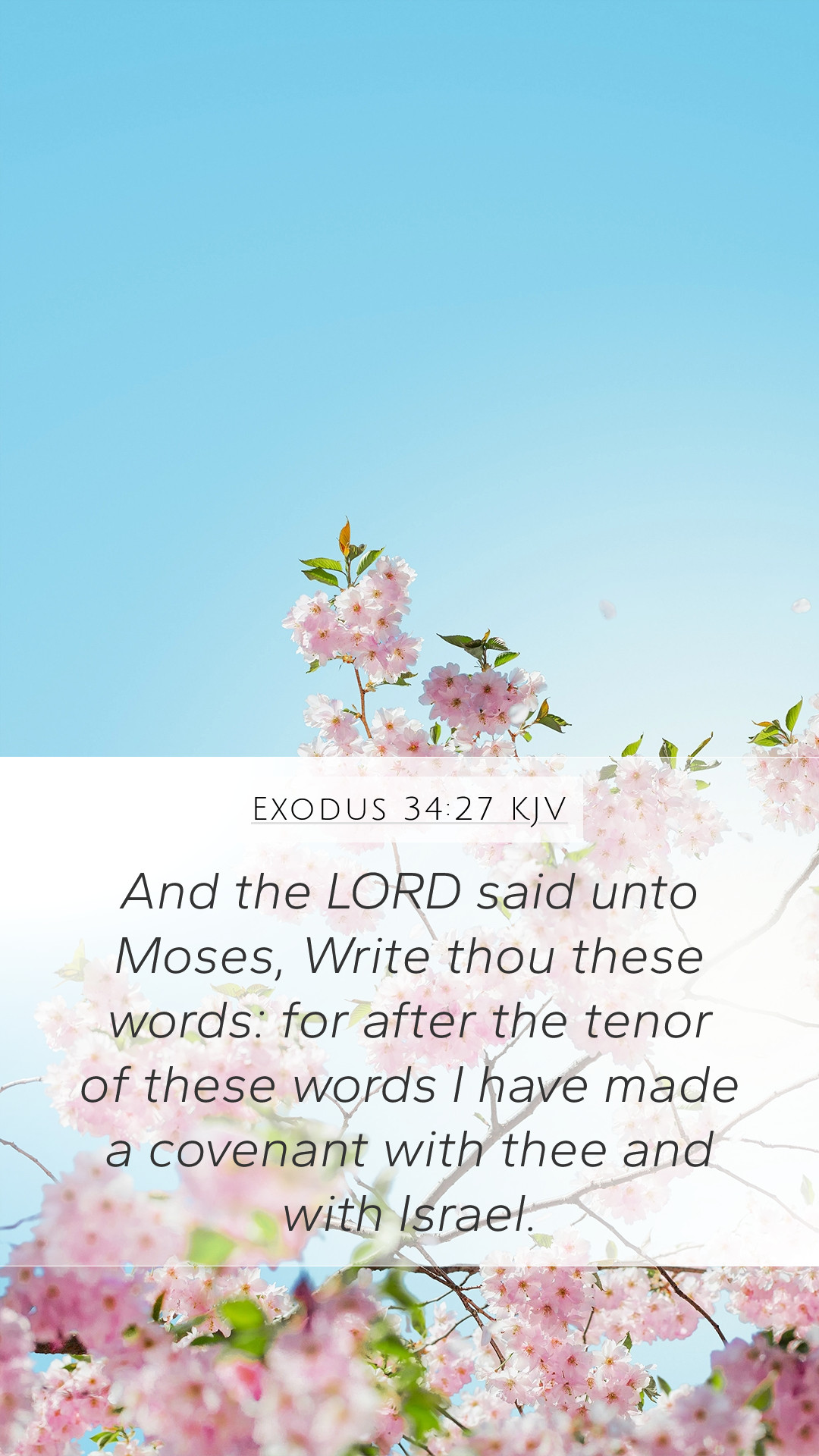Understanding Exodus 34:27 - A Comprehensive Bible Verse Commentary
Exodus 34:27 reads, "And the Lord said unto Moses, Write thou these words: for after the tenor of these words I have made a covenant with thee and with Israel." This verse holds profound significance in the unfolding narrative of the Israelites and their relationship with God. Below, we delve into insights from eminent public domain commentaries to enrich your understanding of this Scripture.
Context and Historical Background
The events surrounding Exodus 34 occur after the Israelites' sin with the golden calf. Moses, mediating between the people and God, receives new stone tablets with the inscribed commandments after God has granted him favor. This passage reflects the restoration of the covenant between God and Israel.
- Matthew Henry Commentary: Henry emphasizes the importance of God's command to Moses to write these words down. This speaks to the idea that God's words are to be preserved and passed down through generations. The written word fosters accountability and remembrance of God’s promises.
- Albert Barnes Notes: Barnes points out that God’s covenant is foundational for Israel, highlighting the reciprocal relationship required of the people. They were chosen to reflect God's nature; thus, their adherence to these commandments is paramount.
- Adam Clarke's Commentary: Clarke elaborates that the act of writing signifies the permanence of God's word. It is not merely for the present but has implications for future generations. The covenant is presented as a central theme, emphasizing God's faithfulness through the ages.
Biblical Exegesis and Commentary Insights
To grasp the full meaning of Exodus 34:27, we consider the theological and moral implications presented in the commentaries:
- The Unity of Commandments: The commandments Moses is instructed to write symbolize the moral and ethical framework God desires for His people. The act of writing down the commandments reflects their importance, as documented in Scripture.
- The Importance of Remembering: The command to write is a reminder that God's dealings with humanity are not to be forgotten. This act preserves the history of divine interaction, serving as a vital part of Israel's identity.
- God’s Covenant with Israel: The covenant is indicative of God's initiative toward humanity. Exodus 34:27 reinforces that God desires a relationship with His people, establishing clear expectations through His commandments.
Practical Applications of Exodus 34:27
Understanding this verse's profound implications extends to contemporary faith practices:
- Engagement with Scripture: Believers are encouraged to engage with Scripture seriously, recognizing its importance in shaping their faith and moral conduct.
- Writing as a Spiritual Discipline: The act of writing one's reflections can deepen one's relationship with God, mirroring the instruction given to Moses. Journaling prayers, insights, and experiences promotes spiritual growth.
- Teaching and Discipleship: As God instructed Moses to preserve the words of the covenant, Christians are tasked with teaching these commands to future generations, ensuring that the truth remains central to faith communities.
Cross References
- Deuteronomy 4:13: Discusses God's commandment to Israel and the significance of covenant.
- Exodus 20:1-17: The original giving of the Ten Commandments, foundational to the covenant.
- Jeremiah 31:33: God’s promise of a new covenant that would be written upon hearts, highlighting the continuation of God's covenantal relationship.
Conclusion
Exodus 34:27 serves as a powerful reminder of the importance of God’s word, the covenant community, and the responsibility of believers to uphold and teach God's commandments. The interplay between God’s directives and human obedience remains a central theme in the narrative of the Bible and encourages continuous reflection and application in our daily lives.
As you explore more about the meaning of Bible verses and engage in Bible study resources, consider the historical context and the profound spirituality woven throughout the Scriptures. The insights derived from public domain commentaries can significantly enhance your Bible study insights and help you form deeper connections with God’s word.


